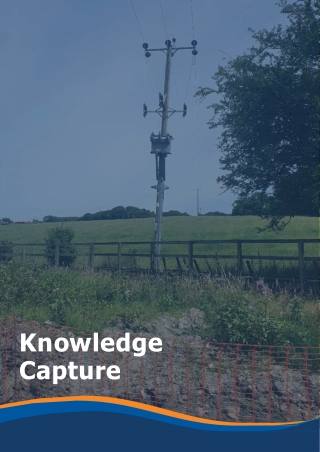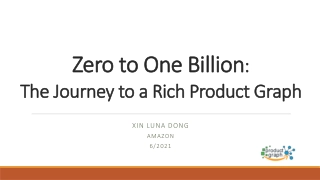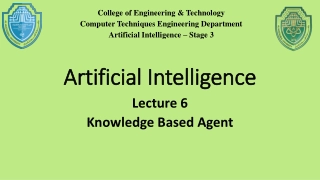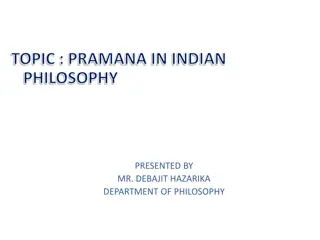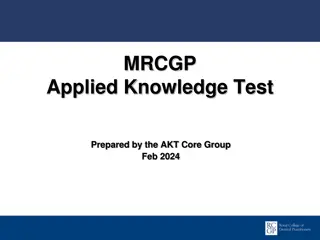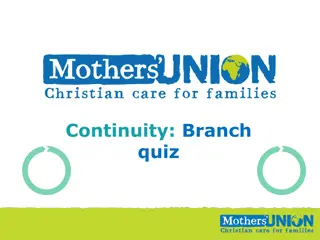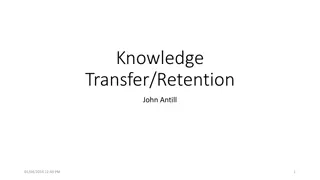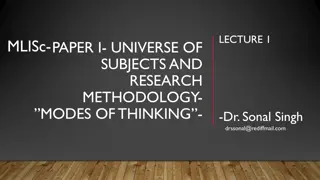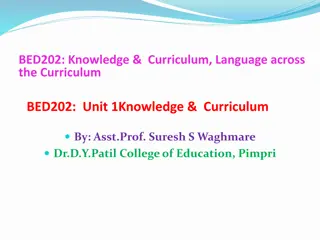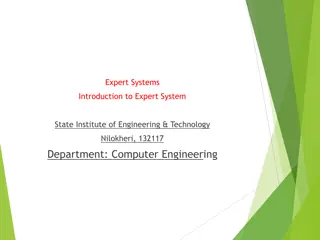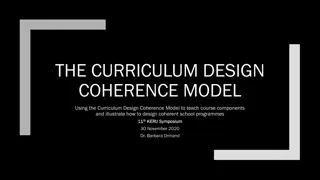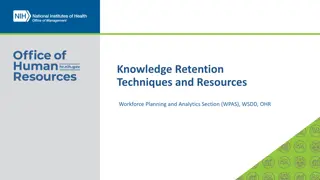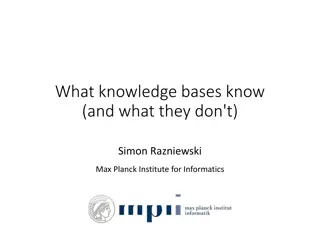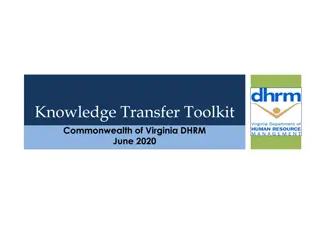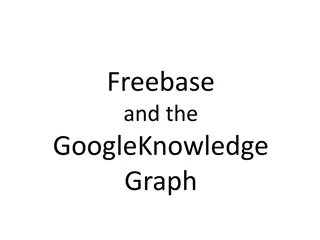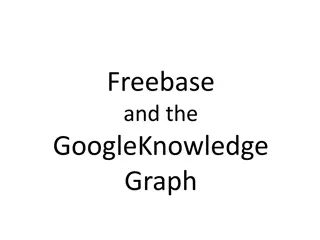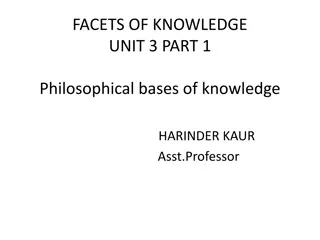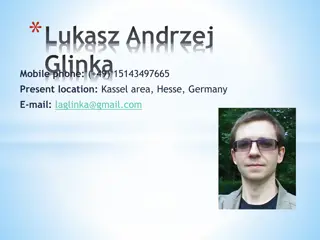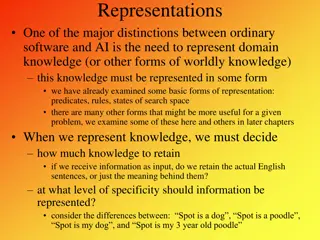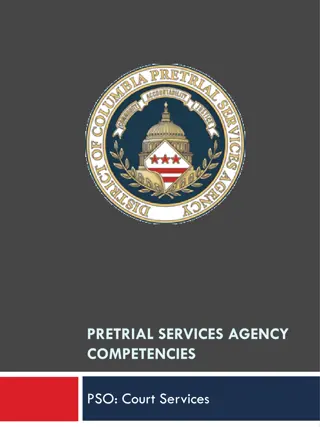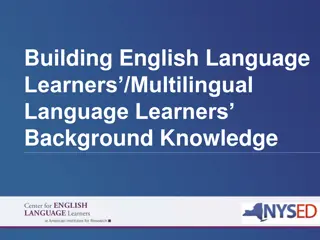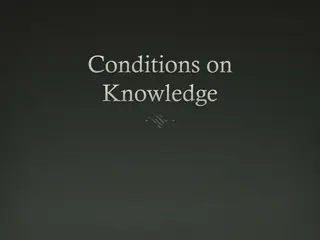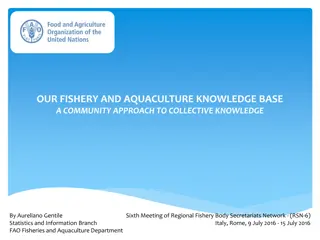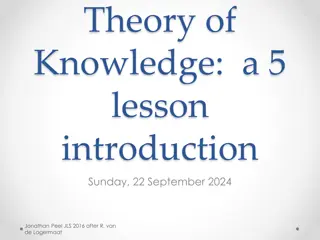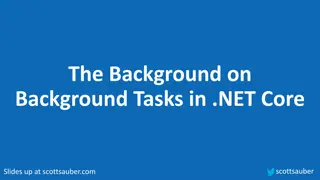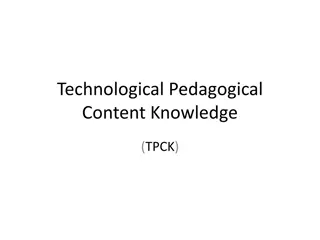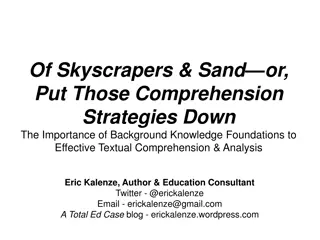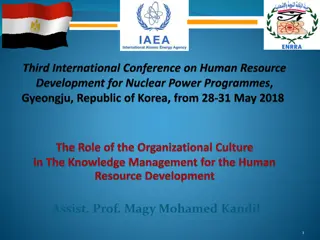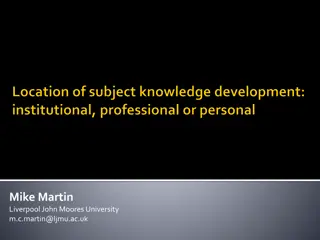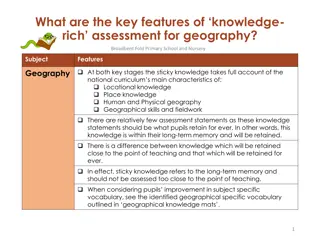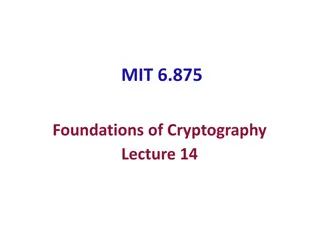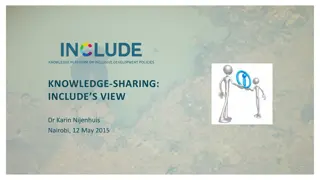Knowledge Capture
Knowledge capture is crucial for organizations to retain valuable expertise and prevent loss of critical knowledge due to employee turnover. Tacit and explicit knowledge play key roles, requiring strategic planning for retention, incentivizing knowledge-sharing culture, and implementing effective st
0 views • 6 slides
Exploring Product and Knowledge Graphs for Enhanced Information Retrieval
Dive into the world of product and knowledge graphs, uncovering the journey to a rich product graph, examples of knowledge graphs for songs, and the mission to provide comprehensive information on products and related knowledge. Discover use cases ranging from information provision to enhancing sear
3 views • 76 slides
Understanding Knowledge-Based Agents in Artificial Intelligence
Knowledge-Based Agents in AI utilize logic and knowledge representation to accept tasks, learn, and adapt to changing environments. Logic plays a crucial role in forming complex world representations and deriving actions based on inference. The central component is the Knowledge Base (KB), represent
3 views • 19 slides
Understanding Knowledge Management: Processes and Frameworks 2. In knowledge management, organizations create, share, and manage knowledge to enhance performance. It involves acquiring different types of knowledge through various means, such as perc
Knowledge Management, Organizational Objectives, Types of Knowledge, Tacit Knowledge, Explicit Knowledge
1 views • 17 slides
Understanding Pramana in Indian Philosophy by Mr. Debajit Hazarika
Philosophy delves into the quest for knowledge, with Epistemology exploring sources and validity. In Indian philosophy, Prama signifies true cognition, attainable through Pramana - the means to achieve valid knowledge. This discussion covers the six pramanas within various philosophical systems and
2 views • 11 slides
MRCGP Applied Knowledge Test
The MRCGP Applied Knowledge Test (AKT) is a crucial assessment for UK general practice trainees in ST2 and ST3 stages. Conducted four times a year, this computer-based test evaluates knowledge, interpretation skills, and application ability. The test format consists of 200 multiple-choice questions
0 views • 73 slides
Pedagogical Shift in Physical Science: Constructing Knowledge Through Learner-Centered Experiences
There is a significant pedagogical shift in physical science education from viewing science as a fixed body of knowledge to emphasizing the process of constructing knowledge. Learners are now placed at the center stage, engaging in inquiry-based learning, critical thinking, and collaborative interac
3 views • 21 slides
USA Archery (USAA) Background Check Policy
USA Archery (USAA) implements a comprehensive Background Check Policy to ensure the safety of athletes and individuals associated with the organization. The policy outlines who is required to undergo background checks, the rationale behind the program, the process involved, and the information requi
0 views • 5 slides
2020 Quiz Rounds - Test Your Knowledge on Events, General Knowledge, Close-up Images, and Food
Test your knowledge with these engaging quiz rounds covering various topics such as events from 2020, general knowledge questions, close-up image rounds, and food-related queries. Challenge yourself and see how well you fare in these diverse categories.
0 views • 13 slides
Importance of Knowledge Retention in Organizations
Organizations face negative impacts on performance due to the loss of knowledge. Strategies such as exit interviews, mentorship, and knowledge sharing tools are vital for effective knowledge retention. Assessing knowledge retention maturity through various techniques is crucial, aligning with ISO st
0 views • 11 slides
Understanding Modes of Thinking and Knowledge Development
Man's acquisition of knowledge is intricately linked to his ability to think, reason, and perceive. Knowledge is a result of experiences gained through perception, intellect, and intuition. The history of humanity is a story of knowledge acquisition and development, with man at the forefront as the
1 views • 18 slides
Understanding Data, Information, Knowledge, and Curriculum in Education
Data is raw facts and figures, information is interpreted data with meaning, and knowledge is the accumulation of facts and information. The nature of knowledge involves acquiring information from real-life experiences and education. This content delves into the distinctions between data, informatio
0 views • 64 slides
Understanding Expert Systems in Computer Engineering
Expert systems are interactive computer-based decision tools that utilize facts and heuristics to solve various problems based on knowledge acquired from experts. This system consists of three main components: User Interface, Inference Engine, and Knowledge Base. The User Interface facilitates commu
3 views • 29 slides
Enhancing Teaching Through Curriculum Design Coherence Model
Explore the use of the Curriculum Design Coherence Model (CDC) for designing effective lectures and guiding pre-service teachers in creating coherent lesson plans. Learn about epistemic progression, systematic ordering of knowledge, types of knowledge, and Bernsteins's knowledge structures to design
0 views • 26 slides
Effective Knowledge Retention Strategies in Workforce Planning and Analytics
Retaining knowledge is crucial for organizations to enhance customer service, foster innovation, improve efficiency, and bridge skill gaps. This article explores the significance of knowledge retention, the types of knowledge essential for succession planning, and two effective strategies - the Know
0 views • 10 slides
Exploring Knowledge Base Construction and Commonsense Knowledge in Fiction
Delve into innovative research interests focusing on knowledge base construction using fictional texts as archetypes, taxonomies for constructing knowledge bases, and extraction of commonsense knowledge from diverse sources. Challenges such as sparsity and semantics are addressed through comprehensi
3 views • 48 slides
Knowledge Transfer Toolkit for Organizational Success
This toolkit, developed by the Commonwealth of Virginia DHRM in June 2020, covers the essentials of knowledge transfer, including its definition, impact, challenges, and management strategies. It emphasizes aligning knowledge transfer with strategic goals, overcoming barriers through leadership supp
2 views • 15 slides
Enhancing Information Retrieval with Augmented Generation Models
Augmented generation models, such as REALM and RAG, integrate retrieval and generation tasks to improve information retrieval processes. These models leverage background knowledge and language models to enhance recall and candidate generation. REALM focuses on concatenation and retrieval operations,
1 views • 9 slides
Understanding Required Background Checks for Providers in 2019
Explore the essential background check requirements for providers in 2019, covering topics like Staff Exclusion List (SEL) checks, Criminal Background Checks (CBC), authorized person responsibilities, and temporary approvals. The checks are crucial for applicants with substantial contact with servic
1 views • 64 slides
Evolution of Freebase and the Google Knowledge Graph
Freebase was initially created in 2005 as an open shared database of knowledge, later acquired by Google and absorbed into the Google Knowledge Graph. Its approach included crowdsourcing updates and additions, focusing on data rather than text. The schema of Freebase included around 1500 types, 3500
1 views • 12 slides
Evolution and Demise of Freebase and the Google Knowledge Graph
Freebase was launched in 2005 as an open database of knowledge, initially populated with Wikipedia data and later incorporating crowdsourced updates. Acquired by Google in 2010, it was transitioned into Google's Knowledge Graph before being decommissioned in 2016. The schema contained around 1500 ty
4 views • 12 slides
Facets of Knowledge: Exploring Philosophical Bases and Types
Delve into the philosophical foundations and types of knowledge with insights on local and universal knowledge, theoretical and practical aspects, and school versus out-of-school knowledge. Understand how facets contribute to extended knowledge about attributes within different frames.
0 views • 10 slides
Lukasz Andrzej Glinka - Non-fiction Writer and Science Author with a Diverse Academic Background
Lukasz Andrzej Glinka is a prolific non-fiction writer and science author known for his extensive publication record, academic achievements, and editorial contributions. With a background in theoretical physics and a wealth of experience at prestigious research institutions worldwide, he has establi
0 views • 6 slides
Understanding Knowledge Representation in Artificial Intelligence
In AI, representing domain knowledge is crucial and comes in various forms like predicates, rules, and search space states. Deciding the level of specificity and form of representation is key. Knowledge can be categorized into procedural, domain, and common sense knowledge, available in forms such a
2 views • 32 slides
PSO Court Services Competencies: Knowledge and Skills for Pretrial Services Agency
This content outlines the competencies required for Pretrial Services Officers (PSOs) in Court Services, focusing on knowledge of diagnostic systems, regulatory requirements, organizational protocols, mental health conditions, and more. It details the expectations, skills, and competencies PSOs need
0 views • 16 slides
Effective Strategies for English Language Learners/Multilingual Learners
Welcome to the presentation series sponsored by the New York State Education Department Office of Bilingual Education and World Languages. This first presentation focuses on building background knowledge to support teachers in scaffolding English Language Arts instruction for ELLs/MLLs. Discover met
0 views • 43 slides
Exploring Epistemology: Understanding Knowledge and Truth
Epistemology delves into the nature of knowledge, understanding, wisdom, and justification, questioning the extent of human knowledge and the different kinds of knowledge. It explores skepticism and conditions on propositional knowledge, discussing whether knowledge implies truth and the debate betw
1 views • 54 slides
Navigating the World of Big Data, Knowledge, and Crowdsourcing
The world has evolved into a data-centric landscape where managing massive amounts of data requires the convergence of big data, big knowledge, and big crowd technologies. This transformation necessitates the utilization of domain knowledge, building knowledge bases, and integrating human input thro
1 views • 5 slides
Enhancing Fisheries and Aquaculture Knowledge for Sustainable Development
The Fishery and Aquaculture Knowledge Base, presented at the Sixth Meeting of Regional Fishery Body Secretariats Network, focuses on collective knowledge exchange in the fisheries and aquaculture sector. This knowledge hub offers a wealth of information on various aspects, supporting Sustainable Dev
0 views • 13 slides
Exploring the Nature of Knowledge in Theory of Knowledge
Delve into the essence of knowledge with Jonathan Peel's introduction to Theory of Knowledge, pondering on how different disciplines perceive knowledge, the impact of empirical questioning, and timeless wisdom on ignorance and progress. Explore the concept of basic knowledge and its implications, in
0 views • 37 slides
Understanding Background Tasks in .NET Core
Explore the world of background tasks in .NET Core with this informative slideshow by scottsauber. Learn about various types of background tasks, suitable problems, available options like IHostedService, BackgroundService, Worker Service, Hangfire, and more. Discover how to choose the right option f
0 views • 41 slides
Understanding Modelling Knowledge and Knowledge Representation
Explore the significance of modelling knowledge through knowledge representation, making it explicit, independent, and reusable. Learn why knowledge representation is essential and how it facilitates exchange, query, inference, and visualization. Delve into examples of knowledge application in vario
0 views • 30 slides
Understanding Technological Pedagogical Content Knowledge (TPCK)
Technological Pedagogical Content Knowledge (TPCK) is a framework developed by Punya Mishra and Matthew J. Koehler that integrates content, pedagogy, and technology for effective teaching. TPCK emphasizes the interaction between these three key components to enhance technology integration in educati
0 views • 55 slides
Importance of Background Knowledge for Effective Textual Comprehension
Understanding the significance of background knowledge in enhancing textual comprehension is crucial for education. The article emphasizes the misinterpretation of Bloom's Taxonomy and the need to recognize reading as more than just a skill. It highlights the importance of foundational knowledge in
0 views • 25 slides
Enhancing Human Resource Development through Knowledge Management
Monitoring and improving human performance in nuclear facilities is a key challenge, with knowledge management playing a crucial role in increasing staff competence. Organizational culture influences knowledge-sharing success. Explore the components of knowledge management, its importance in nuclear
0 views • 17 slides
Overview of Care Provider Background Screening Clearinghouse
The Care Provider Background Screening Clearinghouse, created by the Agency for Health Care Administration, streamlines background screening processes for various agencies. It allows agencies to make determinations based on established criteria, generates reports, maintains employee rosters, and rep
0 views • 35 slides
Understanding Subject Knowledge Development in Education
Exploring the complexities of subject knowledge development in education, this study delves into areas such as students' existing knowledge, competencies, and the role of institutions in shaping knowledge acquisition. The focus lies on personalizing knowledge to individual needs rather than a fixed
1 views • 22 slides
Key Features of Knowledge-Rich Assessment in Geography at Broadbent Fold Primary School
Broadbent Fold Primary School emphasizes sticky knowledge in geography assessment focusing on locational knowledge, place knowledge, human and physical geography, and geographical skills. Assessment statements aim to facilitate long-term retention of knowledge, vocabulary acquisition, and fieldwork
0 views • 8 slides
Zero-Knowledge Proofs in Cryptography
Exploring zero-knowledge proofs in cryptography, this content delves into interactive protocols, perfect zero-knowledge definitions, and the QR protocol's honest verifier and malicious verifier zero-knowledge theorems. It discusses how simulators work to maintain zero-knowledge properties and the si
0 views • 37 slides
Knowledge Sharing and Inclusive Development Policies
Knowledge Platform on Inclusive Development Policies (INCLUDE) focuses on enhancing research utilization in policy-making to foster more inclusive development. It was established in 2012 with the aim of bridging the gap between research and policy processes in African countries. INCLUDE engages expe
0 views • 8 slides
